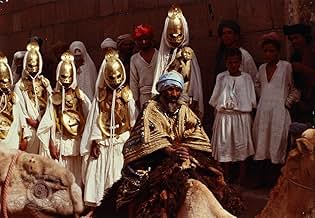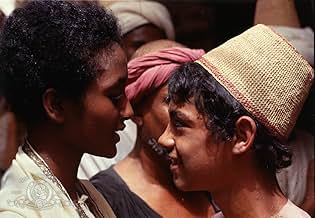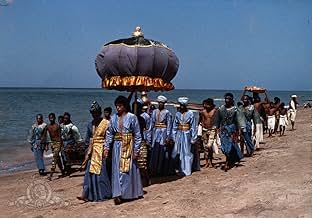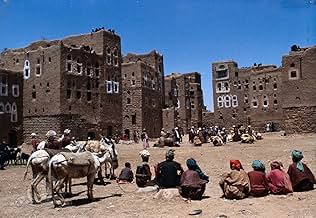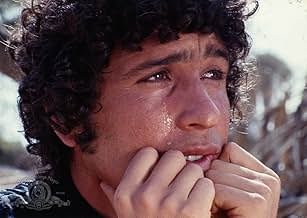CALIFICACIÓN DE IMDb
6.6/10
9.6 k
TU CALIFICACIÓN
Antigua Arabia. Una hermosa esclava elige a un joven para que sea su nuevo amo. Después es secuestrada y deben buscarse el uno al otro. Las historias se cuentan dentro de las historias: el a... Leer todoAntigua Arabia. Una hermosa esclava elige a un joven para que sea su nuevo amo. Después es secuestrada y deben buscarse el uno al otro. Las historias se cuentan dentro de las historias: el amor, los viajes y los caprichos del destino.Antigua Arabia. Una hermosa esclava elige a un joven para que sea su nuevo amo. Después es secuestrada y deben buscarse el uno al otro. Las historias se cuentan dentro de las historias: el amor, los viajes y los caprichos del destino.
- Dirección
- Guionista
- Elenco
- Premios
- 1 premio ganado y 3 nominaciones en total
Tessa Bouché
- Aziza
- (as Tessa Bouche')
Margareth Clémenti
- Madre di Aziz
- (as Margaret Clementi)
Elisabetta Genovese
- Munis
- (as Elisabetta Vito Genovese)
- Dirección
- Guionista
- Todo el elenco y el equipo
- Producción, taquilla y más en IMDbPro
Opiniones destacadas
Whether or not you like some (or just respond positively to some) of Pier Paolo Pasolini's work, or you don't, will depend on how much one can take of provocative subject matter put forward in an upfront manner. For me, he's a director that can go both ways, be it completely muddled and pretentious (Teorema) or almost boring in its S&M tactics of twisted satire (Salo), or actually dramatically engaging (Mamma Roma), and he's never someone who takes the easy road. Arabian Nights is another one, as part of a 'trilogy' of films adapted from famous, erotically-laced works of stories that have scandalized for centuries (the others the Decameron and Canterbury Nights). Once again, Pasolini has a lot of people in his film that aren't actors, or even real extras- sometimes some people will just pop out, or a bunch of kids will run around, and they're plucked right from the scenery. If authentic, film fans, is what you want, Pasonili gives it, in all of the style of a guy out to shoot a documentary on the people in these settings and gets (pleasantly) sidetracked by a bunch of crazy-tragic stories of love and lust in the desert.
As if done in a pre-Pulp Fiction attempt at non-linear storytelling, we get the tale of Zumurrud (Ines Pellegini) and Nur ed din (Franco Merli), one a slave who is bought by the most innocent looking kid in the bunch of bidders. They fall in love, the wise young girl and naive grunt, but they get separated after she gets sold to another man. She escapes, but becomes the unwitting king after she is mistaken for a man. Meanwhile, her young little man is calling after her/him, and getting into his own trouble. Through this framework, we get other stories told of love lost and scrambled; a sad and silly story of a man who's engaged to his cousin, and is thwarted by a mysterious woman who gets his attention, which leads him down a path of semantics (yes, semantics, poetry-style) and sex, leaving his much caring cousin behind. Then there's the man who woos a woman who is under the ownership of a demon, and once their affair is discovered some unexpected things happen via the Demon (Franco Citti, maybe the most bad-ass character in the film despite the surreal-aspect of the showdown). And then one more story, which, hmm....
I could go on making descriptions, but then this wouldn't be much of a review of praise of the picture. Suffice to say it's one of Pasolini's strongest directed efforts, where he's surefire in his consistent usage of the hand-held lens, getting his actors to look sincere through dialog that is half ripped-from-the-pages and half with the sensibility of Pasolini as a poet (yes, I went there in the whole 'he's a poet' thing, but he is in a rough-edged and melodramatic timing and flow). He's also going for an interesting combo; neo-realist settings for a good chunk of the picture, set in and around real locations in areas that don't need much production design, and an epic sweep that includes many extras, some special effects at times (and how about that lion!), and extravagant costumes.
I also liked- if not loved- how Pasonili dealt with sex and more-so the human body itself. It would probably rightfully get an NC-17 if released today in America, and got an X when released in 1980. The dreaded 'thing' of a man is revealed about as often as a cut-away to a master shot of a building. Everything, in fact, is filmed frankly, without the style that tip-toes around the starkness of two people embraced and naked. But it's also not pornographic either; if anything Pasolini perhaps doesn't direct far enough with the sex, as one body just lays still on top of another. There's a specific intent to dealing with sexuality in this world that respects lust and desire from the original text without making it blatant- only in one big instance, involving the fate of the man from the cousin story (the one with Aziz I think) revels in the horror of sex that was delved tenfold in Salo. Add to this the exquisite score from Ennio Morricone, who enriches any scene his score pops up, as a mandolin strings away and the strings rise with just a hint of the sentimental. Without Morricone, in fact, it might not be as emotional a film, when need be.
And lest not forget Arabian Nights can be strangely comical, where Pasolini throws it back at the audience that he knows he's going (rightfully) into the surreal. Like with the story of the Demon and the fate of a man transformed as a chimpanzee, or the vision with the lion, or even the dialog in the pool with the three girls and the man, which is humorous while keeping a tongue-in-cheek. And there's even some good jokes to come out of the obvious step of having Zummurrud as the 'King' when it's clear as day from the Italian dubbing that he's the 'she', so to speak, as it stretches out into a final scene where lovers are united and things are as they should be, however much the director is thumbing his nose at power and sex and the dealings of the heart with organs. Arabian Nights probably couldn't be made today, but could anyone else but Pasolini make it anyway? There's daring in this film, and through the exotic exteriors and sets we see a filmmaker working along like there's nothing else to stop him, for better or worse. This time for the better.
As if done in a pre-Pulp Fiction attempt at non-linear storytelling, we get the tale of Zumurrud (Ines Pellegini) and Nur ed din (Franco Merli), one a slave who is bought by the most innocent looking kid in the bunch of bidders. They fall in love, the wise young girl and naive grunt, but they get separated after she gets sold to another man. She escapes, but becomes the unwitting king after she is mistaken for a man. Meanwhile, her young little man is calling after her/him, and getting into his own trouble. Through this framework, we get other stories told of love lost and scrambled; a sad and silly story of a man who's engaged to his cousin, and is thwarted by a mysterious woman who gets his attention, which leads him down a path of semantics (yes, semantics, poetry-style) and sex, leaving his much caring cousin behind. Then there's the man who woos a woman who is under the ownership of a demon, and once their affair is discovered some unexpected things happen via the Demon (Franco Citti, maybe the most bad-ass character in the film despite the surreal-aspect of the showdown). And then one more story, which, hmm....
I could go on making descriptions, but then this wouldn't be much of a review of praise of the picture. Suffice to say it's one of Pasolini's strongest directed efforts, where he's surefire in his consistent usage of the hand-held lens, getting his actors to look sincere through dialog that is half ripped-from-the-pages and half with the sensibility of Pasolini as a poet (yes, I went there in the whole 'he's a poet' thing, but he is in a rough-edged and melodramatic timing and flow). He's also going for an interesting combo; neo-realist settings for a good chunk of the picture, set in and around real locations in areas that don't need much production design, and an epic sweep that includes many extras, some special effects at times (and how about that lion!), and extravagant costumes.
I also liked- if not loved- how Pasonili dealt with sex and more-so the human body itself. It would probably rightfully get an NC-17 if released today in America, and got an X when released in 1980. The dreaded 'thing' of a man is revealed about as often as a cut-away to a master shot of a building. Everything, in fact, is filmed frankly, without the style that tip-toes around the starkness of two people embraced and naked. But it's also not pornographic either; if anything Pasolini perhaps doesn't direct far enough with the sex, as one body just lays still on top of another. There's a specific intent to dealing with sexuality in this world that respects lust and desire from the original text without making it blatant- only in one big instance, involving the fate of the man from the cousin story (the one with Aziz I think) revels in the horror of sex that was delved tenfold in Salo. Add to this the exquisite score from Ennio Morricone, who enriches any scene his score pops up, as a mandolin strings away and the strings rise with just a hint of the sentimental. Without Morricone, in fact, it might not be as emotional a film, when need be.
And lest not forget Arabian Nights can be strangely comical, where Pasolini throws it back at the audience that he knows he's going (rightfully) into the surreal. Like with the story of the Demon and the fate of a man transformed as a chimpanzee, or the vision with the lion, or even the dialog in the pool with the three girls and the man, which is humorous while keeping a tongue-in-cheek. And there's even some good jokes to come out of the obvious step of having Zummurrud as the 'King' when it's clear as day from the Italian dubbing that he's the 'she', so to speak, as it stretches out into a final scene where lovers are united and things are as they should be, however much the director is thumbing his nose at power and sex and the dealings of the heart with organs. Arabian Nights probably couldn't be made today, but could anyone else but Pasolini make it anyway? There's daring in this film, and through the exotic exteriors and sets we see a filmmaker working along like there's nothing else to stop him, for better or worse. This time for the better.
Fun to see the comments at two extreme posts. There are things like durian and cheese, either you love it, or you hate it! So below is just my personal opinion and you absolutely don't need to agree with me!
It is true that the characters are quite caricatural, but the movie is about one thousand and one nights - it is about fantasies! Honestly i don't ever find the "dreams" typical of hollywoodian movies more appealing. it is just a matter of taste. in fact, through exaggerations, Pasolini let human strengthens and weaknesses magnified and incarnated in the characters. in a way, they are like cartoon characters. Can we call that bad acting? it is just a style of interpretation. Oh, only if we had the innocence like the actors and actress in the movie ... in fact, somehow i found a bit of resemblance (or to the opposite of it!) in these characters to people i know. only if you observe, man! I especially love the story about Aziz and Aziza...
It is above all a movie about love - and there comes sex naturally, and the jealousy, pain, loyalty, betrayal, etc. Even between the "owner" and the "slave", there was absolutely no slavery involves, but just love! well an exchange took place in the market, but that only showed that the slave was actually free. Pasolini didn't have an obsession for the female body which is usually the case in most movies. Is there anything wrong about that? Or are we just too accustomed to female nudity so we always expect it and we become annoyed about male nudity too easily? Both can be beautiful and deserve the same attention from the camera and the audience.
Talking about female vs. male in the movies, i constantly feel that Pasolini pictured man as a simple but too simple (even stupid) creature, while woman as complex and too complex (either a saint or perversed) when it comes to love. But again, it's about fairy tales. Only if it were true, life would be so much easier!
There were poems cited in almost every story and this was one of the most fascinating elements in the movie as well. you may call it erotic, but look at it another way round, who doesn't want his/her own sex and love life to be as poetic and beautiful. I see the humour in the movie with the same lens.
I was also amazed by the flow of the story line - story within a story, and then a personage in the story starts to tell another story... it can be confusing at first, but as the story flows it all became clearer, and at the end, i was simply amazed. or thanks to the DVD technology too, imagine 30 years back when u had to and could only watch it in one go in a cinema!
It is true that the characters are quite caricatural, but the movie is about one thousand and one nights - it is about fantasies! Honestly i don't ever find the "dreams" typical of hollywoodian movies more appealing. it is just a matter of taste. in fact, through exaggerations, Pasolini let human strengthens and weaknesses magnified and incarnated in the characters. in a way, they are like cartoon characters. Can we call that bad acting? it is just a style of interpretation. Oh, only if we had the innocence like the actors and actress in the movie ... in fact, somehow i found a bit of resemblance (or to the opposite of it!) in these characters to people i know. only if you observe, man! I especially love the story about Aziz and Aziza...
It is above all a movie about love - and there comes sex naturally, and the jealousy, pain, loyalty, betrayal, etc. Even between the "owner" and the "slave", there was absolutely no slavery involves, but just love! well an exchange took place in the market, but that only showed that the slave was actually free. Pasolini didn't have an obsession for the female body which is usually the case in most movies. Is there anything wrong about that? Or are we just too accustomed to female nudity so we always expect it and we become annoyed about male nudity too easily? Both can be beautiful and deserve the same attention from the camera and the audience.
Talking about female vs. male in the movies, i constantly feel that Pasolini pictured man as a simple but too simple (even stupid) creature, while woman as complex and too complex (either a saint or perversed) when it comes to love. But again, it's about fairy tales. Only if it were true, life would be so much easier!
There were poems cited in almost every story and this was one of the most fascinating elements in the movie as well. you may call it erotic, but look at it another way round, who doesn't want his/her own sex and love life to be as poetic and beautiful. I see the humour in the movie with the same lens.
I was also amazed by the flow of the story line - story within a story, and then a personage in the story starts to tell another story... it can be confusing at first, but as the story flows it all became clearer, and at the end, i was simply amazed. or thanks to the DVD technology too, imagine 30 years back when u had to and could only watch it in one go in a cinema!
There's a lot of potential moral quandaries associated with this movie: real animals getting killed, disturbingly young actors engaging in simulated sex acts, some unsettling adult themes and the general feeling of heat and stench conveyed by the flies and sweat. Then there's Pasolini's signature shaky camera-work and rough acting from non-actors.
If you can get past the thirty minute mark, and a few boring sequences, you may find yourself like I was charmed enough by its incidents that you keep watching to the end, waiting to see what surprise lay in store next.
It features some wonderful moments that suit the mythical source material, and as plentiful supply of penises there ever was, certainly if you count unique penises, I reckon this could beat most pornos, if that's your cup of tea. They're normally just sitting there, bear in mind, but often they're doing other things.
Not exactly family fare, but for those seeking a bit of weirdness, this may just hit the right spot. It would probably be hilarious if dubbed over Kung Pow style. (Or What's Up Tigerlilly style if you prefer).
5/10 for me.
If you can get past the thirty minute mark, and a few boring sequences, you may find yourself like I was charmed enough by its incidents that you keep watching to the end, waiting to see what surprise lay in store next.
It features some wonderful moments that suit the mythical source material, and as plentiful supply of penises there ever was, certainly if you count unique penises, I reckon this could beat most pornos, if that's your cup of tea. They're normally just sitting there, bear in mind, but often they're doing other things.
Not exactly family fare, but for those seeking a bit of weirdness, this may just hit the right spot. It would probably be hilarious if dubbed over Kung Pow style. (Or What's Up Tigerlilly style if you prefer).
5/10 for me.
This very unique rendering of the Arabian Nights was filmed in natural locations in places as diverse as Ethiopia, Yemen, Iran and Nepal. The beauty of the landscapes is breathtaking, and makes the film an incredible voyage into time and space.
Please note that this movie is an explicitly erotic one, but one tends to forget that the original Arabian Nights were very much so, and not fairy tales for children. It is certainly difficult to make an erotic masterpiece, as sexual content does not make a movie better. It rather tends generally to get crassly exploitative, and rarely beautiful. There is plenty of sex in this movie, but it is depicted in a natural, feel-good and intelligent way that is rarely to be found elsewhere.
By the way, this movie should be seen again at the light of nowadays controversies. The Muslim world was far from always having been puritanical, and the sensual poetry that is rendered here is not Pasolini's invention. It is the faithful reflection of a hedonistic Orient that produced for instance poet Omar Khayyam as well as the original Arabian Nights. It is also a film about love, the most gripping part being the tragic and mysterious tale of Aziz and Aziza.
Don't expect any Aladdin or Ali Baba stuff here, you already figured this out. Anyway, it would be impossible to make a complete film version of the Arabian Nights, so this work just shows a few excerpts combined together (the Italian title is in in fact "the flower of the Arabian Nights"). However, the trend of the tales is respected in the sense that all the stories are interwoven into one another and eventually come back to the original plot.
The atmosphere of ancient Orient is rendered in a style that is lightyears away from usual clichés, and in an incredibly authentic and physical way. At times, you get the illusion that you feel the blazing sun on your skin, that you can smell the exotic vegetation, the sand, the noisy bazaars full of spices. There are a few flaws though : visible cutting, unadapted stances of classical music. The use of non professional actors was common for Pasolini, and gives a pleasant feeling of naive freshness.
The movie is probably Pasolini's best, and belongs to the "trilogy of Life" that included "the Decameron" and "the Canterbury tales", also literature classics. But much more than the two others, this movie is an ode to life. Hard to suspect that Pasolini's last work would be an ode to death. "Arabian Nights" belongs to the golden age of Italian cinema, that was incredibly prolific and innovative in the sixties and seventies.
All in all, not a family movie, but if you are curious and open-minded, get ready for a beautiful journey.
Please note that this movie is an explicitly erotic one, but one tends to forget that the original Arabian Nights were very much so, and not fairy tales for children. It is certainly difficult to make an erotic masterpiece, as sexual content does not make a movie better. It rather tends generally to get crassly exploitative, and rarely beautiful. There is plenty of sex in this movie, but it is depicted in a natural, feel-good and intelligent way that is rarely to be found elsewhere.
By the way, this movie should be seen again at the light of nowadays controversies. The Muslim world was far from always having been puritanical, and the sensual poetry that is rendered here is not Pasolini's invention. It is the faithful reflection of a hedonistic Orient that produced for instance poet Omar Khayyam as well as the original Arabian Nights. It is also a film about love, the most gripping part being the tragic and mysterious tale of Aziz and Aziza.
Don't expect any Aladdin or Ali Baba stuff here, you already figured this out. Anyway, it would be impossible to make a complete film version of the Arabian Nights, so this work just shows a few excerpts combined together (the Italian title is in in fact "the flower of the Arabian Nights"). However, the trend of the tales is respected in the sense that all the stories are interwoven into one another and eventually come back to the original plot.
The atmosphere of ancient Orient is rendered in a style that is lightyears away from usual clichés, and in an incredibly authentic and physical way. At times, you get the illusion that you feel the blazing sun on your skin, that you can smell the exotic vegetation, the sand, the noisy bazaars full of spices. There are a few flaws though : visible cutting, unadapted stances of classical music. The use of non professional actors was common for Pasolini, and gives a pleasant feeling of naive freshness.
The movie is probably Pasolini's best, and belongs to the "trilogy of Life" that included "the Decameron" and "the Canterbury tales", also literature classics. But much more than the two others, this movie is an ode to life. Hard to suspect that Pasolini's last work would be an ode to death. "Arabian Nights" belongs to the golden age of Italian cinema, that was incredibly prolific and innovative in the sixties and seventies.
All in all, not a family movie, but if you are curious and open-minded, get ready for a beautiful journey.
Pasolini is a wonderful, wonderful adventure. Welcoming him into your heart is not without cost; he's a friend who is brilliant on one side and captive to banality on the other.
The bad? Well, its tolerable for me because it is so flamboyantly obvious. The man has a triple curse: he is outrageously gay, he is insufferably Italian and (perhaps because of these two) he has excessively simpleminded storytelling skills. The stories here in their individual content have juvenile dynamics. The way the emotions are handled is comically simpleminded.
That's in the nature of the stories of course, but our man here takes them seriously, so overlain on this is his own sexual nature. These stories are, some of them, erotic in nature and all of them have desire as the driver. Among the various stories, he's chosen these and that's fine enough. The original stories were distributed in places all over the Islamic world, a huge reach, but all of them which included sex joked about the dissonance between Islmac attitudes towards sex and the actual lives of folks within.
But its rather interesting actually watching how his own predilections enter the story. Most of the men here are slaves to their own desires. But those desires are all in the stories skipping over the most superficial of erotic notions. A teenage boy awakes and finds an unconscious teenage girl next to him. He has sex with her. This is equated to "falling in love." It happens over and over and if you encounter these stories in text, its part of the fun.
But see how Pasolini himself enters the story in how he chooses to portray the erotic content. Nudity and youth stand for the erotic, especially the nude boy. When sex is depicted (less than you would expect from the stories) its amazing wooden, mannikins. I suppose if you made some still images of parts of this it would be erotic, but repeatedly seeing the male member of a cartoon tells me that director has the same foibles as the characters we see.
The Good? Well there's more than enough of that to make up for the sexual inadequacies of that part of the world.
There's the absolute beauty of the thing cinematically. It isn't fully cinematic in motion, since Pasolini has no notion of how things flow, what the rhythms of things are. But each shot is fulfilling and some are absolutely breathtaking. He doesn't have any static tableaux like the striking ones in "Matthew," but the visual elegance is erotic in itself. Its a sort of continuous penis shot of life, and you'll find the beauty of the places erotic in their own ways, And then there's the way the stories are crafted.
Yes they are cartoonish. Yes, they have execrable pacing, almost as if they were found objects and put in inappropriate boxes. But the way they are tied one to another is nothing short of brilliant. If we had none of the beauty, and none of the amusement of watching an Italian fop struggle on screen, we'd still have this. And its great.
There isn't any one mechanism that links the stories; there may be a dozen. There isn't any sense to about half of them, and that's part of the miracle. Sometimes they are inside one another, but sometimes they walk through each other. Sometimes it is the same place of extras. Sometimes a repeated situation; "don't eat from that plate." Sometimes it is simply a segue that has no narrative connection at all but just seems nested or siblinged in some way. Its "Sarogossa Manuscript" with fun and beauty.
I must say that one story really is perfect. It alone has two really beautiful women acting erotically. It has expert pacing. It is funny: laugh out loud funny. And it has a punishment that is one of the most arresting images you'll see if you are a guy. Plus it has a framing story that makes me think it was the first one adapted and filmed.
Ted's Evaluation -- 3 of 3: Worth watching.
The bad? Well, its tolerable for me because it is so flamboyantly obvious. The man has a triple curse: he is outrageously gay, he is insufferably Italian and (perhaps because of these two) he has excessively simpleminded storytelling skills. The stories here in their individual content have juvenile dynamics. The way the emotions are handled is comically simpleminded.
That's in the nature of the stories of course, but our man here takes them seriously, so overlain on this is his own sexual nature. These stories are, some of them, erotic in nature and all of them have desire as the driver. Among the various stories, he's chosen these and that's fine enough. The original stories were distributed in places all over the Islamic world, a huge reach, but all of them which included sex joked about the dissonance between Islmac attitudes towards sex and the actual lives of folks within.
But its rather interesting actually watching how his own predilections enter the story. Most of the men here are slaves to their own desires. But those desires are all in the stories skipping over the most superficial of erotic notions. A teenage boy awakes and finds an unconscious teenage girl next to him. He has sex with her. This is equated to "falling in love." It happens over and over and if you encounter these stories in text, its part of the fun.
But see how Pasolini himself enters the story in how he chooses to portray the erotic content. Nudity and youth stand for the erotic, especially the nude boy. When sex is depicted (less than you would expect from the stories) its amazing wooden, mannikins. I suppose if you made some still images of parts of this it would be erotic, but repeatedly seeing the male member of a cartoon tells me that director has the same foibles as the characters we see.
The Good? Well there's more than enough of that to make up for the sexual inadequacies of that part of the world.
There's the absolute beauty of the thing cinematically. It isn't fully cinematic in motion, since Pasolini has no notion of how things flow, what the rhythms of things are. But each shot is fulfilling and some are absolutely breathtaking. He doesn't have any static tableaux like the striking ones in "Matthew," but the visual elegance is erotic in itself. Its a sort of continuous penis shot of life, and you'll find the beauty of the places erotic in their own ways, And then there's the way the stories are crafted.
Yes they are cartoonish. Yes, they have execrable pacing, almost as if they were found objects and put in inappropriate boxes. But the way they are tied one to another is nothing short of brilliant. If we had none of the beauty, and none of the amusement of watching an Italian fop struggle on screen, we'd still have this. And its great.
There isn't any one mechanism that links the stories; there may be a dozen. There isn't any sense to about half of them, and that's part of the miracle. Sometimes they are inside one another, but sometimes they walk through each other. Sometimes it is the same place of extras. Sometimes a repeated situation; "don't eat from that plate." Sometimes it is simply a segue that has no narrative connection at all but just seems nested or siblinged in some way. Its "Sarogossa Manuscript" with fun and beauty.
I must say that one story really is perfect. It alone has two really beautiful women acting erotically. It has expert pacing. It is funny: laugh out loud funny. And it has a punishment that is one of the most arresting images you'll see if you are a guy. Plus it has a framing story that makes me think it was the first one adapted and filmed.
Ted's Evaluation -- 3 of 3: Worth watching.
¿Sabías que…?
- TriviaThis film is the final entry in director Pier Paolo Pasolini's "Trilogy of Life," following El decamerón (1971) and Los cuentos de Canterbury (1972).
- ErroresWhen the chimpanzee is writing, it's clearly visible that it's not actually the chimp writing but an actor wearing a glove made to look like the chimp's hand.
- Créditos curiosos"Truth lies not in one dream, but in many." - Arabian Nights
- Versiones alternativasThe 1990 Water Bearer Films video release (WBF 8001) is marked "Original Uncut Version" with a runtime of 133 min. It is rated X.
- ConexionesEdited into Porno e libertà (2016)
Selecciones populares
Inicia sesión para calificar y agrega a la lista de videos para obtener recomendaciones personalizadas
- How long is Arabian Nights?Con tecnología de Alexa
Detalles
- Fecha de lanzamiento
- Países de origen
- Idiomas
- También se conoce como
- Arabian Nights
- Locaciones de filmación
- Mesjed-e-Imam, Esfahan, Irán(Zumurrud's palace)
- Productoras
- Ver más créditos de la compañía en IMDbPro
Taquilla
- Total a nivel mundial
- USD 755
- Tiempo de ejecución
- 2h 10min(130 min)
- Mezcla de sonido
- Relación de aspecto
- 1.85 : 1
Contribuir a esta página
Sugiere una edición o agrega el contenido que falta



